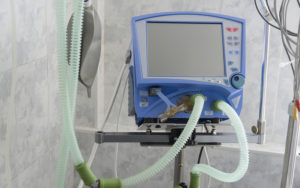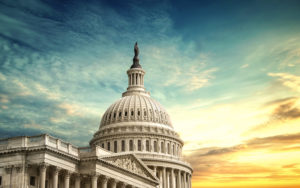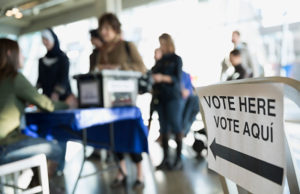
The federal government relaxes regulatory burdens amid the coronavirus pandemic, states struggle to amend election rules, and more…
IN THE NEWS
- The Centers for Disease Control and Prevention (CDC) eased restrictions on workers in critical industries who have been exposed to COVID-19. In a press conference at the White House, CDC Director Robert Redfield announced that critical infrastructure workers exposed to coronavirus can now continue to work, provided they take their temperature before working, wear a face mask at all times, and practice social distancing as much as their work permits. The guidance defined exposure to include being within six feet of a person confirmed or suspected to have COVID-19, including during the 48 hours preceding their symptoms. In addition, the CDC asked employers to assess employee symptoms, to send workers home immediately upon symptom development, and to increase air flow and the frequency of workplace cleaning. Redfield explained that these measures are necessary to prevent worker shortages in critical industries.
- The U.S. Supreme Court recently reversed a controversial order from a federal judge in Wisconsin directing state officials to extend the deadline for mail-in ballots from Wisconsin’s election day by six days. Due to the coronavirus, election officials were overwhelmed with more than one million requests for mail-in ballots, preventing many citizens from receiving their ballots by election day. The 5-4 majority in the Supreme Court maintained that courts should not issue rulings that change election procedures so close to election day. In her dissent, Justice Ruth Bader Ginsburg argued that the Court’s reversal would lead to massive voter disenfranchisement due to the current public health crisis. Justice Ginsburg and three other dissenting justices also pointed out an apparent contradiction in the majority’s reasoning, arguing that “if proximity to the election counseled hesitation” with respect to the lower court’s decision made a few days earlier, then the Supreme Court’s intervention made at a time “even closer to the election is all the more inappropriate.”
- The Independent Community Bankers of America (ICBA) sent Paycheck Protection Program recommendations to the U.S. Department of the Treasury and the U.S. Small Business Administration (SBA) 48 hours after the program went live in response to technical issues that prevented lenders from gaining access to the SBA system and efficiently processing applications. Small business owners faced similar challenges navigating the SBA online portal and crashing bank websites. ICBA recommended enhancing the overburdened SBA systems, increasing funding for the program, and giving the Treasury Department and the Federal Reserve power to purchase program loans from originating institutions. Treasury Secretary Steven Mnuchin reportedly said that “the agencies are working hard to fix issues with the program.” He also announced an additional $250 billion for the program.
- The U.S. Court of Appeals for the Fifth Circuit held that Texas can continue during the coronavirus pandemic to implement its ban on surgeries and procedures that it has deemed not immediately necessary, including abortion services. In a split ruling, the two-judge majority concluded that “when faced with a society-threatening epidemic, a state may implement emergency measures that curtail constitutional rights so long as the measures have at least some ‘real or substantial relation’ to the public health crisis.” Following the decision, Alexis McGill Johnson, acting president and chief executive officer of Planned Parenthood, countered that “abortion is essential, it’s time-sensitive, and it cannot wait for a pandemic to pass.” Similar legal battles over abortion restrictions due to COVID-19 are ongoing in other states, including Alabama, Oklahoma, Ohio, and Iowa. Abortion bans in Alabama, Oklahoma and Ohio have been at least partially lifted.
- The Federal Energy Regulatory Commission (FERC) announced reductions in regulatory burdens for covered organizations to promote continuity in energy systems during the COVID-19 pandemic. The reductions included relaxed standards for compliance program evaluations, self-reporting deadlines, and conduct posting requirements. In addition, FERC created two task forces to expedite the processing of requests for waivers and no-action letters. FERC Chairman Neil Chatterjee supported the measures, stating that “the Commission will not second-guess the good faith actions that regulated entities take in the face of this emergency.”
- The U.S. Department of State announced Monday that it designated the Russian Imperial Movement a terrorist organization. This designation marks the first white supremacist group to receive the official terrorist designation. Secretary of State Mike Pompeo and counterterrorism coordinator Nathan Sales announced the step, making it illegal for Americans to engage in any transactions with the group and permitting the Treasury Department to freeze portions of the group’s assets. Mary McCord, former Acting Assistant Attorney General for National Security, reportedly said that the counterterrorism sanctions system historically targeted Islamist extremist groups, calling the expansion to a white supremacist group an important development.
- The Federal Reserve, Federal Deposit Insurance Corporation (FDIC), and Office of the Comptroller of the Currency temporarily lowered the community bank leverage ratio to 8 percent as required by the Coronavirus Aid, Relief, and Economic Security Act. A higher leverage ratio requires a bank to use more capital to finance its assets, which reflects the ability of the bank to meet its financial obligations. Under these new rules, a banking organization that has a leverage ratio of 8 percent or greater and meets other additional criteria can use the community bank leverage ratio framework until the re-establishment of 9 percent or greater leverage ratio requirements on January 1, 2022. Banks that qualify for the community bank framework can more easily satisfy their risk-based and leverage capital regulatory requirements, enabling struggling banks to lend more of their resources during the pandemic.
- Secretary of Agriculture Sonny Perdue approved Arizona and California’s request to offer online purchasing options for Supplemental Nutrition Assistance Program (SNAP) households. Congress authorized a pilot program for online shopping six years ago, but only eight states—including Arizona and California—allow food stamp recipients to purchase food online. This approval permits Arizona and California to expedite implementing online food purchasing with authorized SNAP online retailers. In response to state requests for SNAP online purchasing—which have increased following COVID-19 social distancing requirements—Lisa Davis of No Kid Hungry emphasized the urgent need to expedite decisions.
- President Donald J. Trump issued an executive order establishing the Committee for the Assessment of Foreign Participation in the United States Telecommunications Services Sector, previously known as Team Telecom. Led by the Attorney General and composed of the U.S. Secretary of Defense and U.S. Secretary of Homeland Security, the committee reviews Federal Communications Commission (FCC) licensing applications for potential threats to national security and law enforcement. FCC Chairman Ajit Pai signaled that ongoing rulemaking proceedings on this issue will be suspended. Notable changes to current policy include establishing a 120-day limit on application review and allowing a majority vote of commissioners to trigger review of any current FCC license. Pai released a statement of support that highlighted the Commission’s rejection of a licensing application from China Mobile in an effort to “protect our networks from foreign threats.”
WHAT WE’RE READING THIS WEEK
- President Donald J. Trump’s concern over the cost of social distancing measures led to a debate over the economic harm from current public health interventions and whether they will outweigh the negative health outcomes of the COVID-19 pandemic. The preliminary results of a paper by Sergio Correia, an economist at the Federal Reserve Board, and his coauthors, however, found that American cities with early and aggressive non-pharmaceutical interventions, such as social distancing, experienced a relative increase in real economic activity after the 1918 flu pandemic. Although their analysis suggests that social distancing measures can mitigate the economic effects of the COVID-19 pandemic, Correia and his coauthors stress that the epidemiologic differences between COVID-19 and the 1918 flu—as well as economic differences between the two time periods—may limit the ability to apply their results to the current COVID-19 pandemic.
- In a response to Horst Eidenmüller’s post on the Oxford Business Law Blog on regulatory competition as a tool to combat COVID-19 with “tailored solutions” and “experimentation,” Marco Ventoruzzo, professor of corporate law at Bocconi University in Milan, argued that encouraging regulatory competition principles amid a global pandemic ignores the potential for “thousands of dead people, massive unemployment, and social havoc.” Although he acknowledges a failure to coordinate efforts globally, Ventoruzzo suggests that the objective failure to facilitate information sharing and social distancing efforts implies an imperative for better coordination. Due to the current lack of “uniformity, reliability, comparability, and transparency” of data collection methods and research, Ventoruzzo advocates solidarity rather than economic strategy, extolling the potential benefits of a coordinated system of response to the public health emergency.
- In a recent article in the Journal of Science Policy and Governance, Wajeeha Ahmad and Elizabeth Dethy of Massachusetts Institute of Technology proposed policies for how smart city technologies should collect personal data. The authors acknowledged that new technologies such as license plate readers, facial recognition algorithms, and traffic vibration sensors may help city governments improve public safety and reduce traffic, but warned that failure to collect and store data properly will decrease personal privacy. Ahmad and Dethy argued that technological solutions alone cannot offer enough privacy protection, so legislative action is needed to set comprehensive reforms, including warrant requirements, prohibitions on the sale of personally-identifiable data, and strict enforcement regimes.
FLASHBACK FRIDAY
- In a 2017 essay for The Regulatory Review, Naomi Lopez Bauman, director of health care policy at the Goldwater Institute, defended the Right to Try Act against criticism that it could endanger patients. Lopez Bauman explained that the law allows patients who have been diagnosed with a life-threatening disease to receive treatments that the U.S. Food and Drug Administration (FDA) has yet to approve. Only procedures deemed safe enough that they are approved for ongoing FDA clinical trials may be attempted under the legislation, and patients must have first exhausted all available approved treatments. Lopez Bauman also argued that the Right to Try Act reduces red tape during applications for experimental procedures and returns health autonomy to patients and their physicians.



